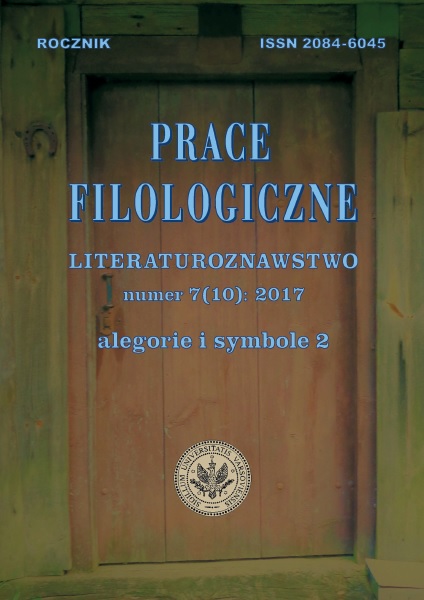Jan Palach w czeskiej poezji
Jan Palach in Czech poetry
Author(s): Robert KulmińskiSubject(s): Czech Literature
Published by: Wydział Polonistyki Uniwersytetu Warszawskiego
Keywords: Jan Palach; samospalenie; bohater; poezja; Jan Palach; self-immolation; hero; poetry
Summary/Abstract: The article tackles the analysis of lyrical pieces dedicated to Jan Palach. From the extensive material, including inter alia Kazimierz Wierzyński’s poem {Na śmierć Jana Palacha w Pradze} broadcasted by the radio station of Radio Free Europe, or the piece written by a popular Bulgarian poet, Valery Petrov, entitled {Self-immolation}, I have selected only those works which were created in Czechoslovakia right after Jan Palach had committed self-immolation. The primary reason for such a selection is that they were composed shortly after Palach’s act and were written by Czech and Slovakian poets emotionally committed to the dramatic political suicide of a young Prague student and experienced the events of January 1969 directly. As a consequence, the following works remain in my interest: Miroslav Holub’s {Praha Jana Palacha} and Josef Kainar’s {Bolest ať mi poví}, published in a weekly magazine of the Association of Czechoslovakian Writers {‘Letters’} on 23rd January 1969, Jan Skácel’s {Hořící keř}, as well as the poem by Pavol Horov (born Pavol Horovčák) {Malé rekviem za Jana Palacha a iných}, both published in {‘Letters’} on 6th and 13th February accordingly, and the poem written on 30th January 1969 by Jan Zábrana entitled {První (Noc v Tatrách)}. I do not include in my study poems {Janu Palachovi} and {Poslední} written by Jan Palach’s follower, Jan Zajíc, because, despite their literary value, they were not initially intended for publishing. Zajíc wrote them only for himself and probably, had he not committed self-immolation, they would not have been published to date. The aspects I am mainly interested in in the works referred to above are the manners of articulating the heroization of Jan Palach and his act. Indeed, these poems constitute a part of heroic discourse, they create heroic narration and present the self-immolated person in a blaze of glory as an indisputable hero. Artykuł poświęcony będzie analizie utworów lirycznych dedykowanych Janowi Palachowi. Z bogatego materiału zawierającego między innymi wiersz Kazimierza Wierzyńskiego „Na śmierć Jana Palacha w Pradze” wygłoszony na antenie Rozgłośni Polskiej Radia Wolna Europa, czy utwór popularnego bułgarskiego poety Valerego Petrova zatytułowany „Samospalenie”, wybieram jedynie te dzieła, które powstały w Czechosłowacji tuż po dokonaniu przez Jana Palacha samospalenia. Przede wszystkim dlatego, że wszystkie one powstały krótko po jego samospaleniu się i pisane są przez czeskich i słowackich poetów, zaangażowanych emocjonalnie w dramatyczne samobójstwo polityczne młodego praskiego studenta i bezpośrednio przeżywających styczniowe wydarzenia 1969 roku. W konsekwencji, w polu mojego zainteresowania pozostają wiersz Miroslava Holuba „Praha Jana Palacha” oraz Josefa Kainara „Bolest ať mi poví” opublikowane w tygodniku Związku Pisarzy Czechosłowackich „Listy” 23 stycznia 1969 roku, utwór Jana Skácela „Hořící keř” a także wiersz Pavola Horova (wł. Pavol Horovčák) „Malé rekviem za Jana Palacha a iných”, oba wydane również w czasopiśmie „Listy”, odpowiednio 6 i 13 lutego a także napisany trzydziestego stycznia 1969 przez Jana Zábranę wiersz zatytułowany „První (Noc v Tatrách)”. Pomijam w swoich rozważaniach utwory naśladowcy Jana Palacha, Jana Zajíca „Janu Palachovi” oraz „Poslední” ponieważ, pomijając ich wartość literacką, pierwotnie nie przeznaczone były one do druku. Zajíc napisał je tylko dla siebie i prawdopodobnie, gdyby nie dokonał samospalenia, pozostałyby nieopublikowane o dziś. W wyżej wymienionych utworach interesują mnie przede wszystkim sposoby artykułowania heroizacji postaci i czynu Jana Palacha. Są bowiem te wiersze częścią dyskursu bohaterskiego, współtworzą narrację heroiczną, przedstawiają samospalonego w glorii chwały, jako niezaprzeczalnego bohatera.
Journal: Prace Filologiczne. Literaturoznawstwo [PFLIT]
- Issue Year: 2017
- Issue No: 7 (10)
- Page Range: 243-256
- Page Count: 14
- Language: Polish

